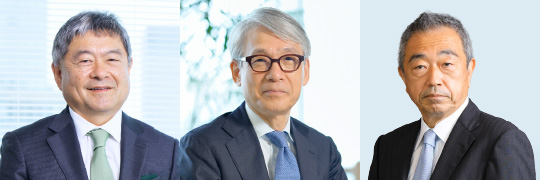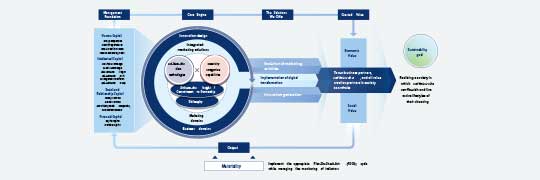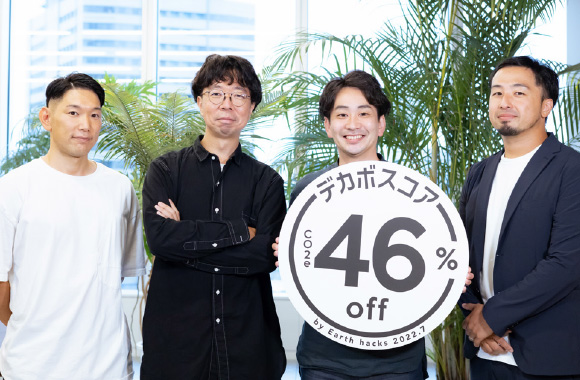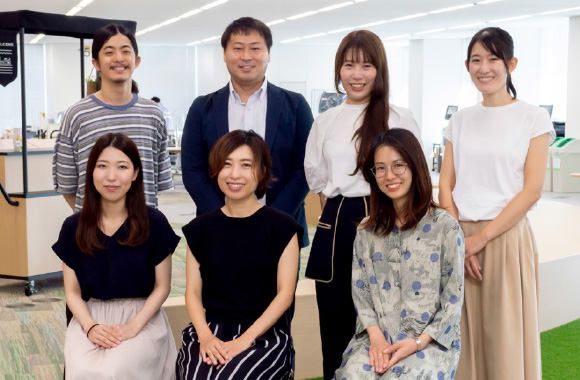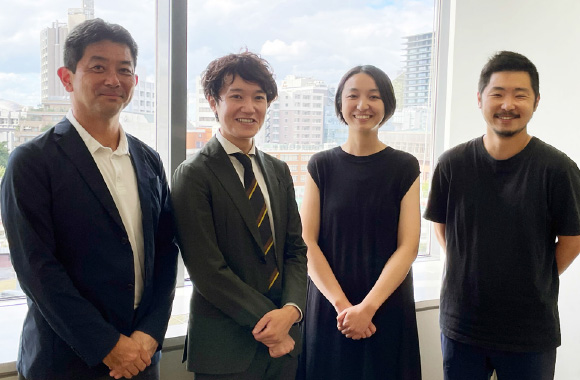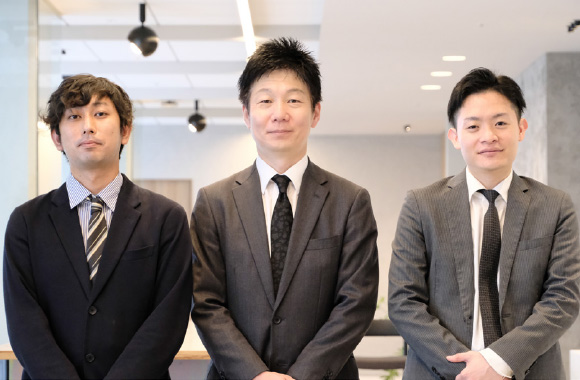Developing a Co-Creation Model for Local Transportation to Address
the Social Issue of Regional Mobility — Noccal
-

Members of the Hakuhodo MaaS project
(From left)Hatakeyama, Horiuchi
In Japan’s rural areas, simply getting around is becoming more difficult for some local residents, as public transportation systems decline and more elderly people give up their driver’s licenses. To address this situation, Hakuhodo is working with various stakeholders to develop new public transportation services. We are promoting a project to implement the concept of sei-katsu-sha-oriented Mobility as a Service (MaaS), which is designed to work in partnership with local residents and become part of the social fabric.
-

Hatakeyama Noccal Asahimachi (Noccal) is a MaaS project that Hakuhodo developed in collaboration with the town of Asahi, Toyama Prefecture, and partner company Suzuki Motor Corporation. We launched a pilot project in August 2020 and from October 2021 Noccal has served as the town’s official public transportation system.
By utilizing private vehicles to provide transportation for shopping and other errands, Noccal aims to increase opportunities for getting around and to reinvigorate the community. With this system, drivers preregister the times when they plan to depart. The people hoping to ride along also choose the times when they would like to travel. Dedicated locations are set as “stops” where drivers can pick up passengers at the agreed-upon times.
The impetus for this project came from personal experience. I was wondering how my mother, who was living alone in a rural area, could get around after giving up her driver’s license. Recognizing that this situation spoke to a larger social issue, I decided to do what I could to resolve it.
In Asahi, Toyama Prefecture, 44% of the population is elderly. As older people give up their driver’s licenses, more and more residents require public transportation services. Railway stations, community buses, and taxis provide a range of public transportation options, but sustaining these modes of transportation presents various issues. By adding Noccal into this mix, we aim to provide a sustainable solution to mobility issues across the region.
In the town of Asahi, it seems some residents already used to make a point of picking up and dropping off people from the community when they were traveling somewhere. However, people were sometimes hesitant to ask for a ride because they felt that returning the favor would be difficult. Some felt that formalizing Noccal as a service would work better, as they thought it would make it easier to take advantage of a service they were paying for. Meanwhile, some drivers wanted to contribute to the local community but were not sure how to do so. The Noccal arrangement provided everyone with a simple way to participate.
The name Noccal has become popular too—locals lovingly refer to it as “Noccal-san.” We heard a story about a woman in her 90s who was able to go out for the first time in several years thanks to Noccal. Her caregiver suggested she try the service, saying that Noccal would make it easy for her to go out.
Noccal, a ride sharing service using private vehicles that Hakuhodo utilized its sei-katsu-sha insight to develop and successfully introduce into society, serves as a model example of how we can help address the social issues people face. This sei-katsu-sha-oriented MaaS, which demonstrates our creativity as an advertising company, enabled us to collaborate with industry and leverage our expertise to design a sustainable business that benefits society. In fiscal 2022, the Ministry of Land, Infrastructure, Transport and Tourism adopted this framework to expand the Noccal service through its Regional Transportation Co-Creation Model Demonstration Project. As part of this project, we are building a service model to restructure local transportation, which is an issue common to municipalities across the country.
In addition, the efforts of Asahi, Toyama Prefecture were recognized beyond their impact on mobility issues, as a means for addressing social issues across an entire region. Noccal was selected as one of six model projects that realize the Japanese government’s Vision for a Digital Garden City Nation, receiving a Type 3 promotional subsidy from this initiative. Hakuhodo, meanwhile, launched a project to solve social issues and lead to a sei-katsu-sha-driven society, and we have begun to develop and co-create services, solutions, and systems in a wide range of areas including transportation, education, economic vigor, and health.
-

Horiuchi Noccal is like a business that creates an operating system for society. Bringing the Noccal framework into alignment with public transportation is a worthwhile initiative in itself, but some local residents think that it is something that the government should be doing. In addition to resolving the issue of mobility, our goal is to come up with ideas for resolving issues for the town as a whole. For example, Noccal makes residents more mobile, which can invigorate communication within the town and help people feel happier.
The key to Noccal’s service design was to ensure that the people and businesses in the town were kept informed throughout the planning process. It has become almost the norm for regional transportation systems to operate at a loss. Against this backdrop, the basic idea for this project was to design a system that makes full use of the region’s existing assets, without Hakuhodo (as an outsider) bringing in more costly solutions. The stand-out feature of this project is its creativity, centering on the idea that a car-oriented society is an asset in Japan’s rural areas. This project flips the relationship from what is standard practice in rural areas (drivers using private cars for personal journeys) to one of using private cars as public transportation—the community-friendly practice of people picking up and dropping off their neighbors.
Noccal was highlighted as the first instance in Japan of Private Paid Passenger Transport in Cooperation with Operators (a new system established by the Ministry of Land, Infrastructure, Transportation and Tourism), with the Asahi town office taking the lead in developing “public transportation operated by a municipality.” Kokuto Jidosha Shokai, a transportation company in Asahi, has taken the lead in managing drivers and operating a reservation system. The result is a system of public transportation of, by, and for the community that involves collaboration among local drivers, the local government, and a local company.
Being “co-created public transportation”—the service is provided by the local government, managed by a local company, and operated by local drivers—Noccal has an easy appeal among local residents. Noccal gave local residents an opportunity to rethink their own public transportation. By working alongside local taxi and bus operators, we are aiming to solve mobility issues throughout the region; we also want to go beyond mobility to help revitalize the entire town.
The Noccal system was designed by the Hakuhodo Group, and is designed to be easy to use by its main beneficiaries, the elderly. Recognizing that sitting at our desks and theorizing would not help us understand the situation, we went out to places in Asahi where elderly residents gather, such as residents’ associations, local hospitals, and supermarkets. We also made several visits to Kokuto Jidosha Shokai, which manages reservations for Noccal. Each visit to the region to hear local residents’ opinions led us to the next iteration of revisions. Initially, we were thinking mainly of a digital reservation and payment system but many elderly people in Asahi do not have smartphones so we mainly opted to use existing, analog systems. For example, the service shares existing bus timetables and bus stops. Telephone reservations are handled by Kokuto Taxi’s dispatch center. Fares are paid in the same manner as existing public transportation, using the familiar paper bus tickets. On the other hand, as Noccal is a private public transportation service operated by ordinary drivers—which is very different from existing transportation—we have developed an app for drivers to ensure safe and secure operation. For digitally savvy users, we also offer a LINE reservation system. Meanwhile, the design of the back-end portion (the reservation and driver management system used by town halls and operators) is completely digital, facilitating the use of a PDCA cycle for operation data. We see this as an example of the digital transformation of a public transportation system that truly marries analog and digital technologies.

